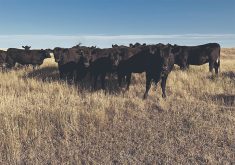Cannabis became legal for recreational human use in October of 2018. At that time, there was much concern in the veterinary community about the impact of legalization on pet health.
In particular, it was assumed that dogs may be at increased risk of cannabis intoxication. With legalization, it was feared, there would be more cannabis in homes as more people bought and partook, thus creating more opportunities for dogs to accidentally consume their owner’s stash.
Following legalization in Colorado, for example, calls to a pet poison information line about cannabis ingestion increased by more than four times the previous number.
Read Also

Beef check-off collection system aligns across the country
A single and aligned check-off collection system based on where producers live makes the system equal said Chad Ross, Saskatchewan Cattle Association chair.
On the human side, there is evidence that an increased number of Canadians have tried cannabis following legalization compared to before, so it makes sense to infer that more dogs may have been exposed.
A recent study led by senior author Dr. Daniel Joffe in the September issue of the Canadian Veterinary Journal has shown that there was no discernable increase in pet intoxications following legalization in 2018.
The study compared cases of cannabis intoxication before legalization to the one-year period after it was made legal. All cases were from the VCA Canada Calgary Animal Referral and Emergency Centre (also known as the Calgary CARE Centre).
In the one-year pre-legalization period, there were 39 cases seen at the CARE Centre compared to 35 cases after legalization. While the number is lower, the difference is not statistically significant.
An interesting side result of this study was that puppies were significantly more likely to see a veterinarian for cannabis toxicity compared to adult dogs. The study authors attribute this finding to the explorative nature of puppies’ eating behaviour, which makes them more likely to consume unknown substances compared to adult dogs.
It is interesting that this study did not find any differences in the number of cannabis toxicity cases. While it offers an important snapshot into the Canadian experience with pets and legalized cannabis for humans, it does have some important limitations.
The study included only one veterinary clinic, and this clinic offers specialist care and caters to emergencies. It may not be representative of the situation elsewhere in Canada or of non-specialty veterinary practice.
It is also possible that owners were reluctant to report that their dog ingested cannabis.
Finally, the cases that were suspected may have been misdiagnosed because several toxicities have similar clinical signs. But overall, this study appears to hold great news for the dog population. No discernable increase in toxicities is a good thing.
However, that doesn’t mean people should be complacent. Dogs appear to be more susceptible to the effects of THC (tetrahydrocannabinol), the active ingredient in cannabis, compared to humans. This sensitivity is thought to make dogs more prone to THC toxicity compared to people.
Edibles such as brownies, cookies and candies, as well as oils may have higher concentrations of THC compared to plant material, and these may taste better to dogs, making them an even great risk for toxicities. Many edibles are also made with chocolate, which is also toxic to dogs at higher concentrations, so these products can pack a double punch.
Clinical signs of cannabis toxicity in dogs include low body temperature, dilated pupils, excessive salivation, vomiting, lethargy, uncontrolled urination and tremors. More serious effects that occur with higher doses include agitation, seizures and inco-ordination. The breathing rate and heart rate may be dangerously increased. Although rare, dogs can die from cannabis toxicity.
Treatment may include making the dog vomit to reduce how much is absorbed from the stomach and supportive care. There currently is no antidote.
Dr. Jamie Rothenburger, DVM, MVetSc,PhD, DACVP, is a veterinarian who practices pathology and is an assistant professor at the University of Calgary’s Faculty of Veterinary Medicine. Twitter: @JRothenburger

















